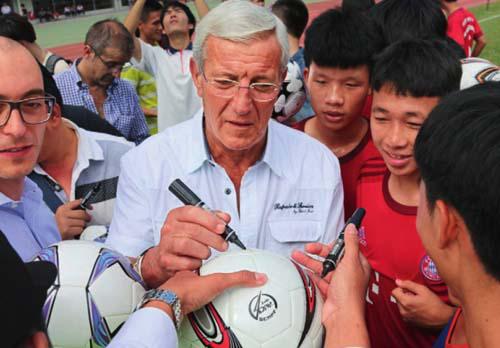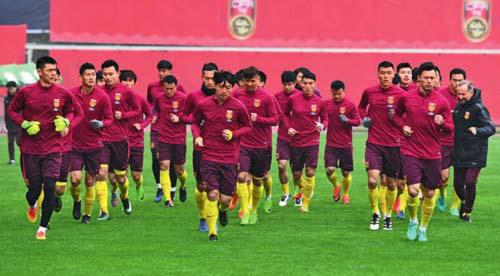China’s Football Dream
2018-07-12ByDEGENHILL
By DEGEN HILL


WHEN most people think of China, foot- ball isnt the first sport that they might associate with the country traditionally dominant in ping pong and badminton. However, there is a huge interest in the sport since it was first introduced to the country in the early 1900s. Chinese President Xi Jinping likes the sport very much. During his tenure, he met with FIFA president Gianni Infantino, visited the Manchester City Football Academy in England, and developed an entire reform plan for football in China.
International Competition
According to the FIFA rankings announced in April 2018, Chinas National Mens Team is ranked 73rd in the world, and Chinas National Womens Team ranked 14th in 2017. Chinas mens team first debuted at the 2002 FIFA World Cup, but subsequently lost all their matches – although this was largely considered Chinas greatest accomplishment in the countrys football history. In addition, the mens team has also won the EAFF East Asian Cup twice, in 2005 and 2010. Chinas womens team has performed better during their appearances in the World Cup, making it to the quarterfinals several times. They have also done well in continental and regional competitions, such as placing third in the AFC Womens Asian Cup in 2018.
Although it is widely acknowledged that China is not yet a football powerhouse, the enthusiasm from the Chinese people about the sport and improving its playing standards is massively underrated. Many local teams have garnered a huge following, and international clubs teams have proved even more popular. The World Cup, Euro Cup, and international friendly matches, regardless of the time difference, are always live-streamed in bars, restaurants, and homes as Chinese fans cheer for their favorite players. The interest for the sport can undoubtedly be felt throughout the country, and in time, will also be felt throughout the world.
Chinese Super League
Part of getting people interested in the sport at an early age can be evidenced by Chinas very own Chinese Super League (CSL), launched in 2004, which rebranded the countrys top-tier division, and has continued to gain popularity and credibility among local fans. The current season of the CSL consists of 16 teams playing 240 games, with Guangzhou Evergrande Taobao as the current champion and one of the most successful clubs in the league, with seven titles. Although not as successful as Guangzhou, both Beijing Guoan and Shanghai Shenhua have devoted fans and matches between these two teams which always feature packed stadiums and high energy.
Matches of the CSL often bring out young fans adorned with their favorite players jerseys, waving giant flags, and cheering with the crowd. This sort of enthusiasm for domestic games is an important part of inspiring and motivating children to be more involved with the sport, start taking classes, and one day, play in front of thousands of cheering fans.
Although perhaps not as popular as other leagues, the CSL has a number of accolades which have steadily improved since 2004. It has the highest average attendance in Asia, is broadcast to 96 countries across the world, and is currently ranked first in the Asian Football Confederation of Asian leagues based on their performances in Asian competitions over a four-year period and FIFA ranking for national teams. The league has done incredibly well since 2004, gaining a number of fans, star foreign players, sponsors, and wide media coverage.
Inviting Foreign Talents
One of the ways that China is working to improve the football skills of Chinese players is by inviting foreign coaches and star foreign players to come play in the CSL. Of the current 16 head coaches of the CSL, 13 are foreign nationals. One such star is Manuel Pellegrini, current head coach of Hebei China Fortune, who previously managed teams in England, Argentina, Chile, Ecuador, and Spain – having coached both Real Madrid and Villarreal.
The CSL also has a number of famous foreign players, such as Carlos Tevez, a well-known Argentine national who played in Europe for a number of years, joining Chinese club Shanghai Shenhua in December 2016 in a deal which made him one of the highestpaid footballers in the world. Not only has this strategy helped attract fans to come see top-level players play for their local team, but it also aims to help Chinese players improve their skills by playing with those who have competitive experience in more challenging leagues. Although this might not seem like a winning strategy, the old adage holds true, “If you want to be the best, youve got to play with the best.”
David Ramírez Valdés, a commentator on sports topics for the Chinese Global Television Network in Spanish (CGTN) said, “China is on the right path, promoting young talent and giving the national players more opportunity to shine in the Chinese Super League. The fact that more and more foreign stars are joining the Super League helps to develop the Chinese players and increase the audience of those games, including the thousands of kids who will guarantee the future of football in China.”
Looking Forward
No matter where you go in China, names like Messi, Ronaldo, and Beckham are known by almost everyone. Many children wear soccer jerseys, and there have been an increasing number of public football fields throughout the country. China is working diligently to transform the enthusiasm for football into active participation. In 2015, the Wall Street Journal reported that China plans to establish 20,000 soccer schools within five years and 50,000 within a decade, 6,000 of which would be set up as part of a new program to cultivate the sport in Chinese campuses. Doing so is a targeted effort by the Chinese Ministry of Education in an attempt to not only garner a bigger interest in the sport, but hopefully, also usher in a fresh generation of skilled football players. “Adopting measures that suit local conditions and gradual improvements are the two requirements weve set,” said Wang Dengfeng, chief of the ministrys department of physical, health, and arts education.
In 2011, Xi announced three personal footballrelated wishes: for China to qualify for another World Cup, to host the event and, finally, one day, to win it. Although China has continued to work towards these goals, the last and only time China qualified for the World Cup finals was in 2002, but both the president and the nation are committed to improvement.
With continued reform, added investment, and new infrastructure, its not unrealistic to think that China could qualify for the Qatar World Cup in 2022, especially if FIFA were to expand the number of qualifying teams to 48. In regards to the sport, this would be considered a huge step forward for Chinas football program. Valdés says, “China is definitely one of the favorites in the bid to organize the 2030 FIFA World Cup. This would give them, in front of their fans, a reason to believe that a new football power has arrived to the international stage.”
